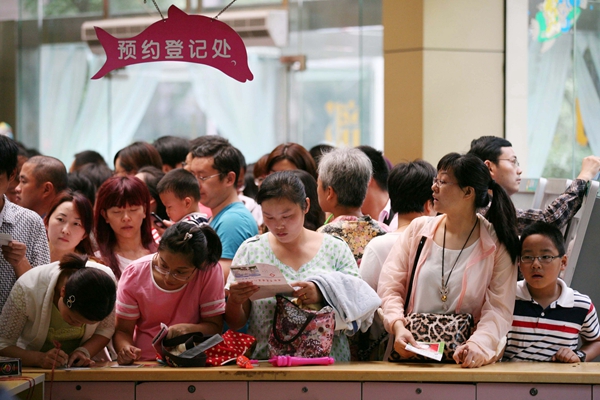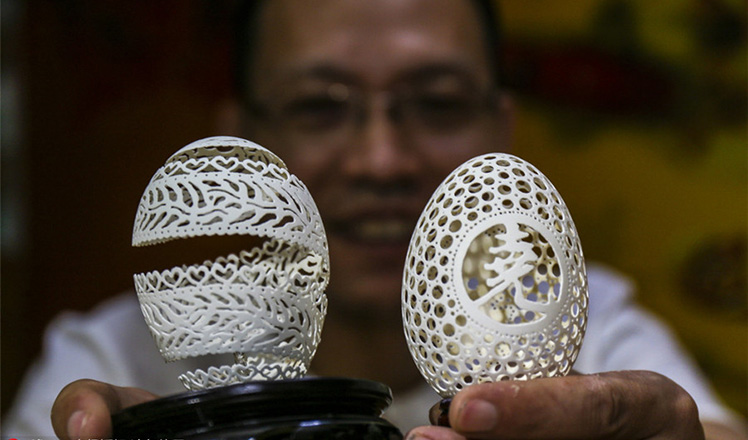Urgent remedy sought for pediatrician shortage
Updated: 2016-02-19 09:36
By CANG WEI/WANG XIAODONG(China Daily)
|
||||||||
 |
|
Parents gather in the outpatient hall of Nanjing Children's Hospital in Jiangsu province to register their children in July 2014.[WANG ZHUANGFEI/CHINA DAILY] |
Huang Songming, director of Nanjing Children's Hospital in Jiangsu province, said he learned from news reports that working hours for pediatricians in China are 1.48 times longer than the average working day for other physicians, but they earn just 46 percent of the average salary for doctors.
"Under such circumstances, how will medical students be attracted to pediatrics? How can you stop pediatricians from quitting?" Huang asked, adding that many pediatric nurses have also quit their jobs or have asked to be transferred to other departments.
Nanjing Children's Hospital receives more than 5,000 patients a day, more than twice the number expected when it was founded in 1953.
According to the Nanjing Health Bureau, 1.02 million children were living in the city last year, but there were fewer than 1,000 pediatricians to treat them.
According to the Guangdong Health and Family Planning Commission, only 8,200 registered pediatricians work in the province, which is home to 21 major cities.
"Pediatricians are some of the worst-paid doctors in China," said Wang Yu, a pediatrician at Huai'an Maternity and Child Healthcare Hospital in Jiangsu. "It's very cheap to consult doctors in China. It usually costs about 10 yuan ($1.50) to consult a physician and 30 yuan to see a senior attending physician.
"Chinese hospitals usually generate income by selling medicines and providing medical checkups. Children's medicines are administered according to the child's weight, so fewer medicines are sold. On average, the dose administered to one adult would be sufficient to treat 10 to 15 children. Also, compared with other medical departments, pediatrics departments conduct fewer examinations and charge lower fees," she said.
The demanding working environment has also contributed to the shortage of pediatricians, according to Wang. "When you treat a child in China, you are usually dealing with a whole family. Many parents and grandparents pay too much attention to the family's only child. They easily become extremely emotional and show no patience in the hospital."
She said doctors often joke that pediatrics and psychiatry top the list of the worst working environments in China's hospitals.
"In my hospital, we hear from time to time that pediatricians and nurses have been confronted by parents, or have even been punched or slapped. Also, younger children are unable to describe their symptoms clearly and many pediatric diseases develop rapidly-that can be dangerous both for the children and the doctors treating them," the 40-year-old said.

 The world in photos: Feb 15 - 21
The world in photos: Feb 15 - 21
 China Daily weekly pictures: Feb 13-19
China Daily weekly pictures: Feb 13-19
 Lantern Festival in the Chinese paintings
Lantern Festival in the Chinese paintings
 Meet Melanie, the real-life mermaid
Meet Melanie, the real-life mermaid
 Samsung unveils new products at mobile conference in Spain
Samsung unveils new products at mobile conference in Spain
 88th Academy Awards Governors Ball Press Preview
88th Academy Awards Governors Ball Press Preview
 Chinese photographers' work shines in major photo contest
Chinese photographers' work shines in major photo contest
 Egg carving master challenges Guinness World Record
Egg carving master challenges Guinness World Record
Most Viewed
Editor's Picks

|

|

|

|

|

|
Today's Top News
What ends Jeb Bush's White House hopes
Investigation for Nicolas's campaign
Will US-ASEAN meeting be good for region?
Accentuate the positive in Sino-US relations
Dangerous games on peninsula will have no winner
National Art Museum showing 400 puppets in new exhibition
Finest Chinese porcelains expected to fetch over $28 million
Monkey portraits by Chinese ink painting masters
US Weekly

|

|







